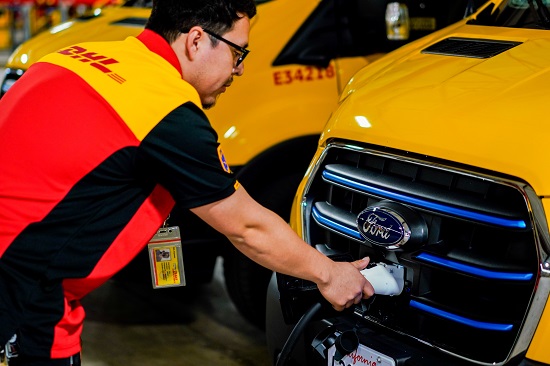DHL, the provider of international express shipping services, is rolling out 45 new Ford E-Transit vans in Palo Alto, Calif. as part of the company’s overall commitment to reaching its ambitious sustainability goals. By 2030, the company plans to operate 60% of its U.S. vehicles electrically and reduce all logistics-related emissions to net zero by 2050.
All 45 of the new e-vehicles are expected to be in operation for pickup and delivery services by the end of 2022, serving Palo Alto and the surrounding communities. The company is also planning to order 180 more electric vans to join its eco-friendly fleet over the next two years.
The new vehicles enhance the existing alternative fuel vehicle (AFV) fleet for DHL Express U.S. operations that currently includes fully electric, hybrid-electric and clean internal combustion varieties, along with electric-assisted e-Cargo Cycles.
E-Transit has a payload of approximately 4,400 pounds, similar to the diesel vans they are replacing—but with zero emissions. It offers a higher daily range than most electric commercial vehicles (up to 126 miles at full battery charge), optimal performance for urban routes and ample cargo space. DHL couriers are also provided with industry-leading training to ensure they are familiar with the vehicles and are confident in its capabilities.
“Sustainability is a significant part of our corporate roadmap, and these new electric vehicles enable us to contribute to clean air efforts in the San Francisco Bay Area, across the U.S. and ultimately, in many countries globally,” said DHL Express U.S. CEO Greg Hewitt. “This is the largest order of electric vehicles we have made in the U.S. thus far, and we look forward to continuing our partnership with Ford in our ongoing effort to reduce the environmental impact of our fleet.”
Deutsche Post DHL Group (DPDHL) is investing EUR 7 billion in the current decade on its path to net-zero emissions logistics. Over the last several years, DHL Express has made significant investments in environmental sustainability including: replacing its legacy air fleet with newer, more fuel-efficient freighters like the B777; testing hydrogen fuel cell technology for heavy-duty ground support equipment; placing its first-ever order of all-electric Eviation Alice cargo planes; establishing zero-emissions facilities in many parts of the world; and providing several green alternatives for its core products.
“We’re proud that E-Transit represents such a vital part of the DHL Express fleet and their plan to reduce logistics-related emissions,” said Tim Baughman, Ford Pro general manager North America. “This collaboration is a great example of how companies can work together to achieve like-minded goals in sustainability today, while helping to create a better world for future generations.”
This follows a recently signed Memorandum of Understanding by Ford Pro and Deutsche Post DHL Group (DPDHL) to speed up electrification of vans around the globe, targeting 2,000 electric vans that include solutions to address logistics specific requirements and maximize uptime, service and productivity. DPDHL currently has a fleet of around 27,000 electric vans operating within its network globally.
SC
MR


Latest Supply Chain News
- Technology’s role in mending supply chain fragility after recent disruptions
- Tech investments bring revenue increases, survey finds
- Survey reveals strategies for addressing supply chain, logistics labor shortages
- Israel, Ukraine aid package to increase pressure on aerospace and defense supply chains
- How CPG brands can deliver on supplier diversity promises
- More News
Latest Podcast

 Explore
Explore
Latest Supply Chain News
- Technology’s role in mending supply chain fragility after recent disruptions
- Tech investments bring revenue increases, survey finds
- Survey reveals strategies for addressing supply chain, logistics labor shortages
- Israel, Ukraine aid package to increase pressure on aerospace and defense supply chains
- How CPG brands can deliver on supplier diversity promises
- How S&OP provides the answer to in-demand products
- More latest news
Latest Resources

Subscribe

Supply Chain Management Review delivers the best industry content.

Editors’ Picks





